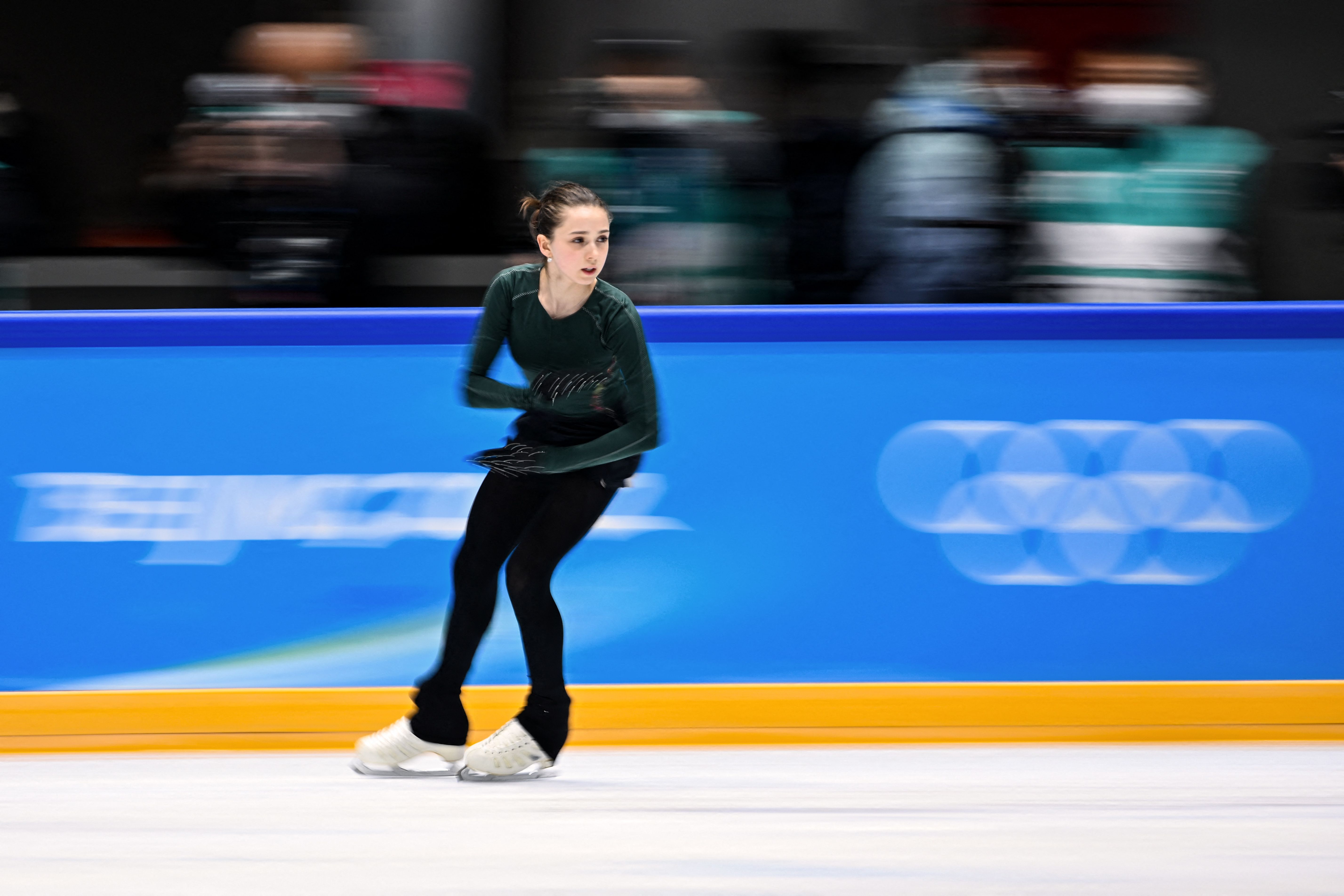Winter Olympics: Valieva claims positive test a result of mix-up with granddad's heart medication
Sign up now: Get the biggest sports news in your inbox

Kamila Valieva in action during a practice session at the Beijing 2022 Olympic Games in Beijing on Feb 14, 2022.
PHOTO: AFP
Follow topic:
BEIJING (REUTERS, AFP) - The 15-year-old Russian figure skater embroiled in a Winter Games doping scandal has defended her positive drug test by saying it was caused by a mix-up with her grandfather’s heart medication, an Olympic official said on Tuesday (Feb 15).
Kamila Valieva made the argument at a hearing with the Court of Arbitration for Sport (CAS) into whether she should be allowed to continue competing in Beijing, Denis Oswald, Permanent Chair of the International Olympic Committee’s (IOC) Disciplinary Commission said.
“Her argument was this contamination happened with a product her grandfather was taking,” Oswald said.
The World Anti-Doping Agency (WADA) and the IOC did not immediately respond to a Reuters email after his comments.
Earlier, the IOC said in a press conference that Valieva’s “B” sample had yet to be analysed despite the initial positive result.
The teenager was cleared by CAS to compete in Tuesday evening’s single event after a panel agreed with the Russian Anti-Doping Agency’s (Rusada) decision to lift a ban on her.
Valieva was tested at her national championships on Dec 25, but the positive test for a banned angina drug was not revealed until Feb 8, after she had already competed at the Beijing Games.
Valieva said the days leading up to her being cleared to compete in the women's singles event at the Beijing Games on Tuesday despite having tested positive for a banned substance had left her emotionally fatigued.
Kamila Valieva made the argument at a hearing with the Court of Arbitration for Sport (CAS) into whether she should be allowed to continue competing in Beijing, Denis Oswald, Permanent Chair of the International Olympic Committee’s (IOC) Disciplinary Commission said.
“Her argument was this contamination happened with a product her grandfather was taking,” Oswald said.
The World Anti-Doping Agency (WADA) and the IOC did not immediately respond to a Reuters email after his comments.
Earlier, the IOC said in a press conference that Valieva’s “B” sample had yet to be analysed despite the initial positive result.
The teenager was cleared by CAS to compete in Tuesday evening’s single event after a panel agreed with the Russian Anti-Doping Agency’s (Rusada) decision to lift a ban on her.
Valieva was tested at her national championships on Dec 25, but the positive test for a banned angina drug was not revealed until Feb 8, after she had already competed at the Beijing Games.
Valieva said the days leading up to her being cleared to compete in the women's singles event at the Beijing Games on Tuesday despite having tested positive for a banned substance had left her emotionally fatigued.
"These (past few) days have been very difficult for me," the 15-year-old told Russia's Channel One in her first comments about the situation.
"It's as if I don't have any emotions left. I am happy but at the same time I am emotionally tired."
The case has hinged on the delay between the collection of her sample and its analysis, which was only carried out six weeks later.
The case has hinged on the delay between the collection of her sample and its analysis, which was only carried out six weeks later.
Valieva was tested at the Russian national championships on Dec 25, but the positive test for a banned angina drug was not revealed until Feb 8, which triggered an automatic suspension. Rusada lifted the suspension on Feb 9.
But the delay allowed her to compete at the Beijing Games on Feb 7, when she led the Russian team to the gold.
Normally drug tests involving athletes preparing to compete in major championships would be expedited by the national anti-doping authority of the country involved.
But the World Anti-Doping Agency said the Rusada made no request to accelerate the testing of Valieva's sample.
If Valieva finishes in the top three of the women's singles event, the medal ceremony will not be held at the Olympics, prompting outrage from athletes and officials around the world.
The United States Anti-Doping Agency (Usada) accused Russia of "hijacking" the Games.
Usada expressed sympathy for the athlete but chief executive Travis Tygart said "only time will tell" if Valieva should have been allowed to compete in Beijing after testing positive for the endurance-boosting angina medication trimetazidine.
He said if Valieva was later disqualified, the CAS ruling will "once again permit the Russians to taint the Olympic Games".
"Either way, for the sixth consecutive Olympic Games, Russia has hijacked the competition and stolen the moment from clean athletes and the public," Tygart said.
"If Russia would have properly processed this sample which they collected weeks prior to the Olympic Games, we would know for certain whether the women's individual event starting tomorrow will be a real competition and whether she should have been allowed to skate in the Figure Skating Team Event."

